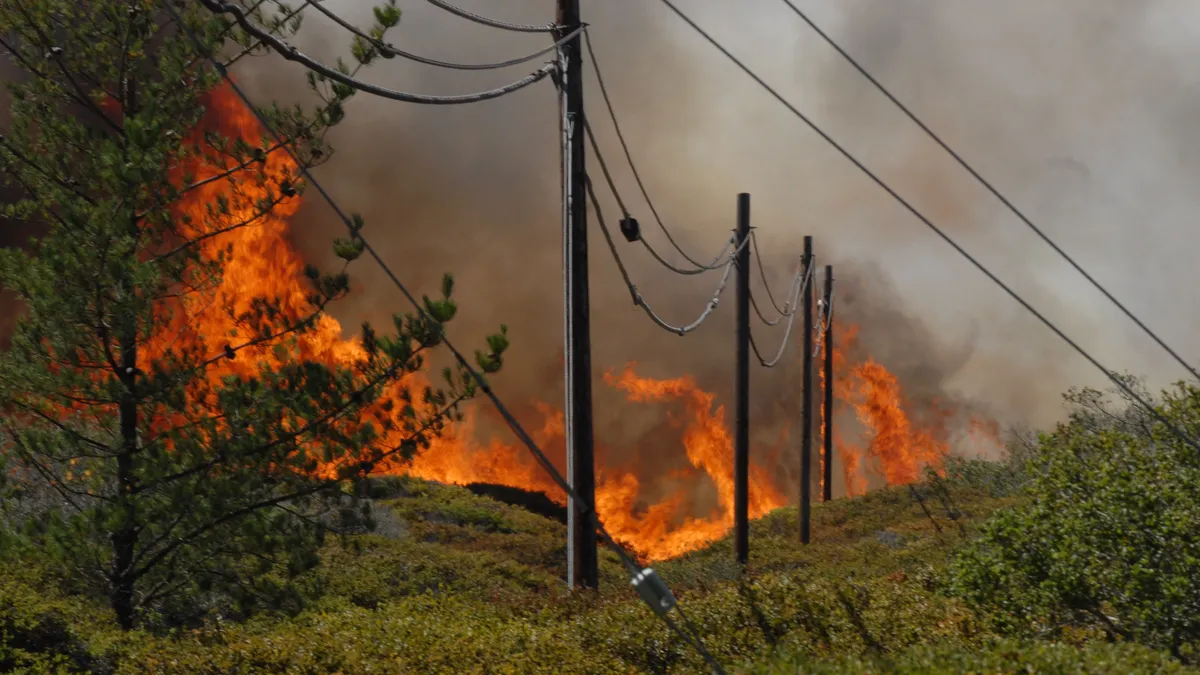Dive Brief:
-
The California Public Utilities Commission (CPUC) has tentatively rejected utilities' requests to include a wildfire risk premium in their authorized return on equity (ROE), after concluding that wildfire legislation and policies that are supportive to investors "have mitigated wildfire exposure faced by California utilities."
-
Pacific Gas & Electric (PG&E), San Diego Gas & Electric (SDG&E) and Southern California Edison (SCE) had asked for increases to their 2020 ROE to compensate investors for wildfire risks. But in a proposed decision issued last week, the CPUC said Assembly Bill 1054 — a sweeping wildfire package passed by the state legislature in July — removed the need for that.
- The CPUC is scheduled to vote on the proposal at its Dec. 19 meeting.
Dive Insight:
The CPUC's proposed decision maintains the utilities' test-year 2020 ROE at 2018 values: 10.3% for Southern California Edison, down from the requested 11.45%; 10.25% for PG&E, down from the 12% it applied for; and 10.2% for SDG&E, compared to the 12.38% it requested.
California's utilities filed their cost-of-capital applications with the commission in April, requesting significant increases to their ROE — the rate of authorized shareholder profit — to counter risks from wildfires. PG&E initially requested a 16% ROE, about a $1.2 billion increase in customer costs, which the utility said would allow it to access the capital required to invest in wildfire safety measures.
In July, after Gov. Gavin Newsom, D, signed AB 1054 and established a state wildfire insurance fund, the utilities filed additional testimony with the CPUC, reducing their requested ROEs. PG&E's requested wildfire adder, for instance, dipped from 5% to 1% after the bill was passed. But all three utilities still requested a premium over their base ROEs to counter wildfire risks due to inverse condemnation, a doctrine that holds them accountable for all the fires caused by their equipment, even with no finding of negligence.
The AB 1054 wildfire fund is supported by initial payments and annual contributions from the shareholders of participating utilities, amounting to $10.5 billion, as well as ratepayer contributions that are collected through a non-bypassable charge. Participating utilities can access a financial backstop for wildfire damage claims that are higher than $1 billion annually. All three utilities have committed to making contributions to the fund, although PG&E can only access it if it exits bankruptcy by June 30, 2020.
According to PG&E, SCE and SDG&E, the legislation reduced wildfire risk but did not completely remove it, in part because of inverse condemnation and the high risk of fires in their service territory. They also pointed to uncertainties around recovering wildfire costs through the CPUC, as well as the possibility that the fund would be exhausted before 2035.
But the CPUC's proposed decision rejects that argument, since AB 1054 and the cost-recovery policies it enacted cap shareholders' exposure to wildfire liabilities, and require them to pay for associated claims only in cases where the utility has been "imprudent."
Given prevalent market conditions, including low interest rates, the commission might have been inclined to actually reduce the utilities' ROE if not for wildfire risks, according to Mike Florio, energy consultant and former CPUC commissioner.
"It's like when you're being pulled in two different directions — you stay where you are," he told Utility Dive.
The CPUC's proposed decision ignores one potential gray area of risk, according to James Sweeney, director of Stanford University's Precourt Energy Efficiency Center: the "prudence" review that the commission applies to decide whether utilities can draw from the fund. Essentially, this means shareholders will have to bear any wildfire costs that are caused by "imprudent" utility behavior.
But according to Sweeney, the complicated nature of determining this standard could mean a utility that has acted "prudently" could be determined, after the CPUC's semi-litigative process, to have been "imprudent."
"I don't think it's as black and white as the [CPUC's administrative law] judge suggested, and I do believe that there is a risk [to utilities] associated with wildfires that is above and beyond the other risks that they already entail," he said.














